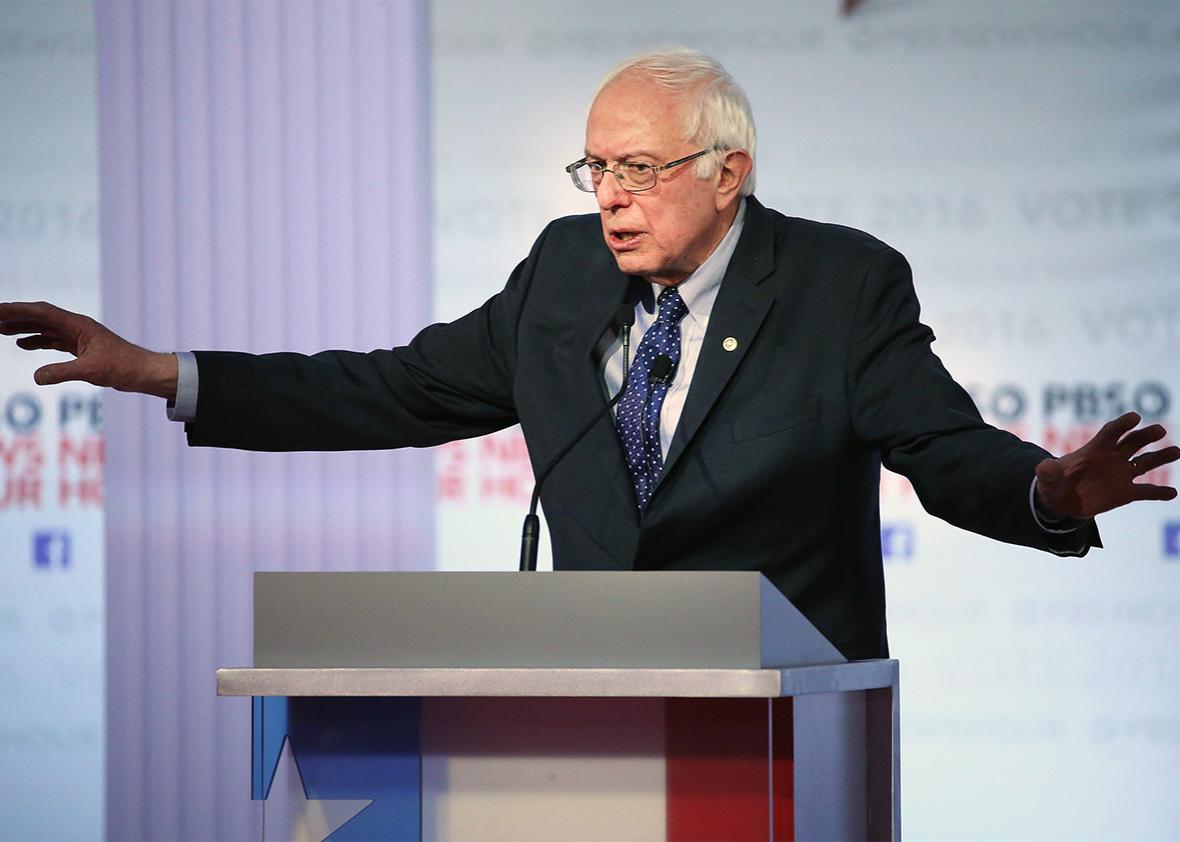Prior to Thursday night’s debate, Bernie Sanders often seemed to be more or less ceding the foreign-policy debate to Hillary Clinton, with the exception of attacking her 2003 vote for the war in Iraq. In previous debates, he’s fallen back on the Iraq crutch, even when asked about North Korea. As Vox’s Max Fisher recently wrote, with this lack of interest in international issues, especially when running against a former secretary of state, Sanders “opens himself up to criticism [that he is] dangerously disengaged while also abandoning a potentially useful line of attack that Clinton is too hawkish.”
Sanders is also blowing a chance to push Clinton to the left on foreign policy as he has on issues like criminal justice reform and income inequality. (Peter Beinart wrote a good piece making this point earlier this week.) He’s also depriving the Democratic Party of a real debate on foreign policy approach, given that the interventionist policies Clinton has supported, including backing the overthrow of Muammar Qaddafi and imposing a no-fly zone over Syria, are out of step with much of her party.
So how did he do on foreign policy Thursday? A little better.
Sanders started out by responding to a broad question from Judy Woodruff about whether the U.S. is prepared for another terrorist attack by again bringing up Clinton’s Iraq vote, setting up Clinton for the prepared zinger: “I do not believe a vote in 2002 is a plan to defeat ISIS in 2016.”
Viewers also got a Cold War history lesson. Discussing “unintended consequences,” Sanders invoked the 1953 CIA–supported overthrow of Iranian President Mohammad Mosaddegh—a sore point in U.S.–Iranian relations to this day—as well as the many sins of Clinton’s friend Henry Kissinger, notably the secret bombing of Cambodia during the Vietnam War that led to the rise of the genocidal Khmer Rouge.
So, yes, Sanders is better at attacking past examples of American foreign policy misadventures than in giving concrete proposals for how he would address current crises. He didn’t have much to say about Syria or confronting Russia. His feints at hawkishness—promising to protect Eastern Europe against Russian aggression and citing Winston Churchill as a role model—felt a little forced. He said he opposed Clinton’s calls for a no-fly zone in Syria, but didn’t really explain why. By contrast, Clinton was clearly in command of the facts on the recently negotiated cease-fire in Syria and the refugee crisis in Europe, whatever you think of her policies.
But Sanders was never going to be the foreign-policy–experience candidate in this race. He even acknowledged this, saying, “Secretary of state for four years. You have a bit of experience, I would imagine.” As long as he can avoid gaffes, which he did in Milwaukee, and the moderators don’t throw any curveballs by asking about violence in Burundi or the elections in Haiti, Sanders can probably skate by, particularly as the Clinton campaign has made the ill-advised choice to go after him as too dovish on Iran and too critical of Israel, both lines of attack unlikely to dissuade left-leaning Democrats from feeling the Bern. I may wish he’d talk more about international issues, but his overwhelming focus on domestic issues has been working for him so far. And at least at the PBS debate, he didn’t seem like he wanted to run off the stage when the foreign policy portion began. He is better today at conveying that he cares about these issues than he was a few months ago.
Still, his current approach isn’t going to cut it in a general election against a Republican candidate. The GOP primary has focused far more on Syria, ISIS, and terrorism generally. Any Republican candidate facing Sanders will attack him as a naïve dovish idealist, unwilling to stand up to global threats. He’s going to need an answer—and “but she voted for Iraq” isn’t going to cut it anymore. He’s also going to need some actual foreign-policy advisors.
Moreover, while it may not be what motivated him to run, international affairs would dominate a large part of his presidency as it does all presidencies. While there’s a remote chance that President Sanders’ universal healthcare plan would ever be passed, he would definitely have to make heartbreakingly difficult decisions that could affect thousands of lives in Syria—and that’s just one crisis we know about now.
Read more Slate coverage of the Democratic primary.
